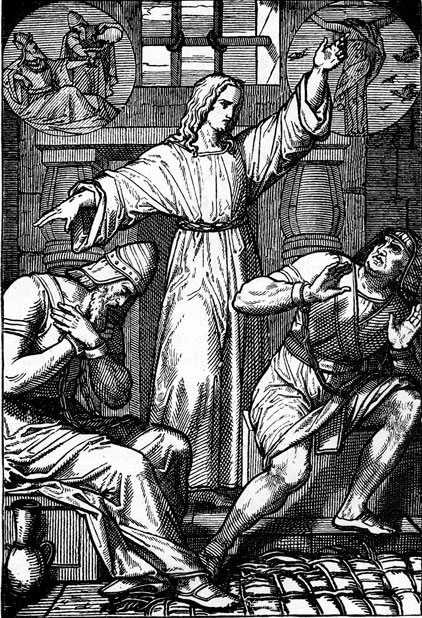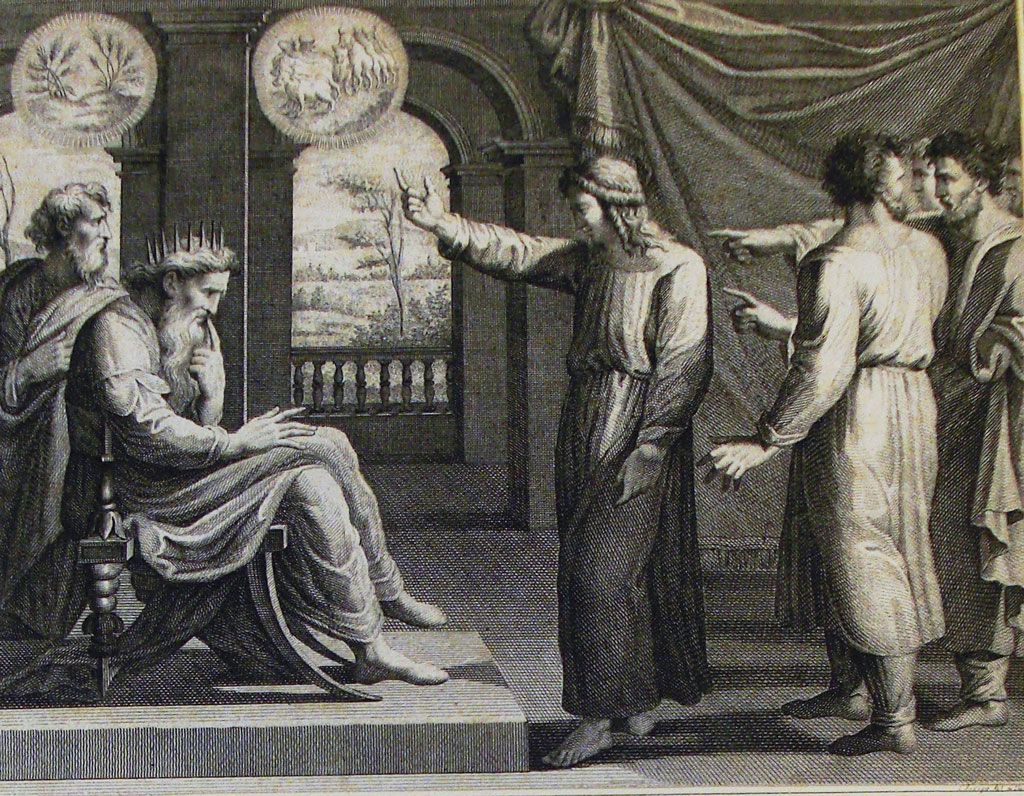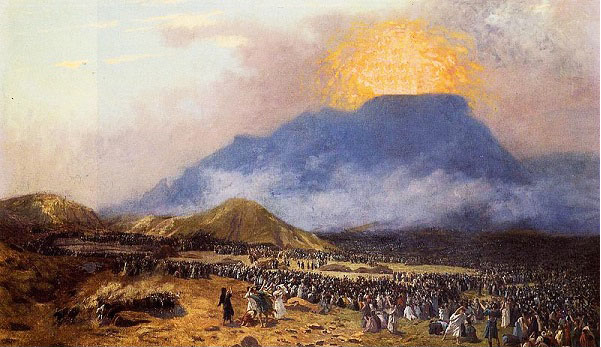So Joseph, who was sold as a slave in Egypt, ended up in prison. But then here too, God did protect him. Impressed with his intelligence and temperament, the prison warden soon put him in charge of supervision of the prison inmates and thus Joseph was spared the hardships he otherwise might have had to suffer.
Time was following its own course and so there unfolded a preordained sequence of events. A few days on, the Pharaoh’s chief butler and chief baker too landed in that very prison, for the offences they had committed had invited the ire of the Pharaoh. In the prison, they became good friends with Joseph.
Once when Joseph visited their prison cell like he did everyday, he noticed that the obvious worry on their faces. On enquiring why, they said they had had strange dreams which had left them anxious.

Joseph lent them an attentive ear. He was in any case, blessed with the ability to interpret the meaning of dreams. Interpreting the dreams of the chief butler Joseph said, “You will be released from the prison in the next three days and will be reinstated in the post you held in the palace.” However, he also made a request. “Do not forget me. Please put in a word for me with the Pharaoh for I have been suffering unfair punishment.” As for the interpretation of the baker’s dream, Joseph prophesied in no uncertain terms that he would be executed in the next three days.
….and that was exactly how it happened! The Pharaoh had his birthday in three days. In commemoration of his birthday, he planned to grant general amnesty to some of the prisoners and therefore asked for the list of prisoners. An inquiry was reconstituted in the cases of the chief butler and the chief baker both; and on the basis of the gravity of their offences, the Pharaoh ordered the release of the chief butler. The chief baker, however, was executed.
In gratitude, the chief butler did bid adieu to Joseph but, overwhelmed with joy at being released and later, caught in the grind of life, Joseph gradually faded from his memory.
Two years passed by. Joseph, as yet in prison, continued to suffer the punishment meted out to him for a crime that he had not committed at all.
But the plan in place for Joseph was progressing on its designated path. Now, the Pharaoh began to have strange dreams. In one of the dreams he saw seven healthy cows, coming out of the Nile River and grazing in the meadows. They were followed by another seven who also emerged out of the Nile. But these looked very weak, sickly and feeble. The weak and tired cows then went on to devour the healthy cows. The Pharaoh had another dream in which he saw a maize (corn) plant that had grown seven cobs with corn. He saw also, another maize plant with cobs but not much corn on them. These other cobs with little corn on them consumed the cobs full with corn.
The Pharaoh woke up with a start. He could not make head or tail of what he had seen in the dreams. Also, what did the number ‘seven’ suggest? He could not figure it out at all. He made a public announcement across the kingdom and invited scholars and wise men to interpret the meaning of his dreams. But no one was able to satisfactorily do it.
While the Pharaoh’s dreams were being discussed at the palace, the chief butler all of a sudden remembered Joseph. He immediately met the Pharaoh and informed him about Joseph’s ability to interpret dreams. Within no time Joseph was released and summoned before the Pharaoh. Joseph was all of 30 years then.
The Pharaoh told Joseph that he was aware of his ability to interpret dreams and accordingly asked him to interpret his dreams.

Before he went on to listen to the Pharaoh’s narration of his dreams, Joseph humbly pointed out to the Pharaoh that the special ability was but God’s grace. After hearing about the dreams, Joseph interpreted them and started to narrate their meaning – ‘O Pharaoh! Your dreams tell me that for the next seven years there would abundance of rains and harvest, and that the kingdom and its subjects would prosper. But this period would be followed by seven years of famine that would be so grave, so horrific, that it would leave no trace whatsoever of the previous seven years of prosperity. Your subjects will be forced to suffer poverty and there would be extreme dearth of food’.
The Pharaoh, who was pleased to listen to the interpretation of the first seven years of abundance, seemed extremely worried on hearing about the following seven years of famine which would beset his country. He trusted Joseph’s prophecies. Unable to devise a solution to the problem, the Pharaoh asked Joseph for advice. On this, Joseph suggested that the wealth earned and the crop reaped in the first seven years be used sparingly and not be squandered. The grain and other resources thus saved could be used later during the seven years of famine to reduce its intensity. But Joseph stressed the need to appoint only an extremely intelligent and honest officer for this task.
To this the Pharaoh replied that as of the moment, he could not think of a worthy name and so assigned the job to Joseph. Joseph consented and was appointed as Pharaoh’s Vizier. Now, as far as power and sway over the kingdom went, Vizier Joseph was next only to the Pharaoh himself.
Joseph set about his work. At the outset, he got very huge warehouses built. These, he ensured, were equipped to store and preserve foodgrain for long durations of time. Then he bought over all the surplus produce from across the kingdom and arranged for its storage at these specially created warehouses. Alongside all these activities, he had maintained good public relations with the people and through this medium made them understand the importance of these storages. People not only started using grains frugally but also started to store the grains for themselves.
At the end of the seven years of prosperity, all the Pharaoh’s warehouses were filled to the capacity. The stock was so vast that it could more than suffice all the needs of the entire Kingdom of Egypt for seven long years, leaving in fact, much surplus. Soon the years of the famine commenced. The stock of grain which was stored by people at their homes was soon exhausted but grain was available in the Pharaoh’s warehouses. Eventually run out of their monetary resources, people started to barter their flocks and other material for grain. The people of Egypt were happy with Joseph for it was his plan that helped them tide over the famine that stretched as long as seven years; As a result of this policy, the Pharaoh owned most of the wealth and assets of Egypt and so he too was happy with Joseph.
It was around this time that Joseph married Asenath, the daughter of a local Egyptian official. They bore two sons, Manasseh and Ephraim.
Incidentally, it was not only Egypt but its neighbouring regions too that the famine had struck. People from these regions now began to come to Egypt to buy food. Joseph was sure that his brothers too would come to Egypt, some day to buy food. Hence he started to systematically register the foreign visitors at the borders.
The news of grain being sold in Egypt reached Jacob. He sent his children to Egypt to buy the grain. His youngest son, Benjamin however, was made to stay back with him. Joseph’s other brothers now reached Egypt.

Joseph was emotional on seeing his brothers. Controlling himself, Joseph decided to test them. They did not recognize their brother Joseph, who stood before them as the Vizier of the Pharaoh, an identity they were totally unaware of. Communicating with them through an interpreter, Joseph made serious allegations against them. He accused them of being spies. Immediately all the brothers fell at his feet and pleaded innocent. They explained that they had come from Canaan only to buy grain. They further added that they were twelve brothers out of which one was missing right since his childhood while another one was back home with their father. They pleaded that Joseph could well consider them his slaves. The scene took him back to his dream and Joseph realized that it had indeed come true. (To be continued…)













